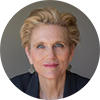Download PDF

Work-life balance is a popular topic of conversation among young physicians. On one hand, it’s terrific that ophthalmologists—male and female—have the freedom to discuss the challenges of integrating family priorities, patient care, career goals, self-care, and leisure. But I must admit that I hate the actual phrase.
To begin with, it doesn’t reflect reality. Our endeavors are far too complex to be described as a balancing act. Work-life balance implies that there is some magical place of harmony where one has devoted just the right amount of attention to career and to the rest of life. I imagine a teeter-totter that is weighted on one side with ophthalmology and on the other side with my spouse and three kids (and exercise, vacation, friends, reading, and entertaining), but it’s erratically bouncing up and down. This isn’t a metaphor that works for me.
I’m also bothered by the implication that work doesn’t count as real life. On the contrary, our work is one of the most meaningful aspects of our lives! It has a concrete purpose: to preserve and restore vision and to show compassion to our patients. And there’s more. Because most of us spend more time at work than at home, our relationships with colleagues, employees, and patients can have the richness and complexity of familial ties. After 28 years of practice, I think of my colleagues as brothers and sisters. So, work doesn’t pull me away from my family; it’s an aspect of family. (In my case this is literally true, as my husband and his uncle are ophthalmologists in our practice.)
In lieu of a teeter-totter, I imagine a web that is composed of my children, husband, sports, ophthalmic practice, colleagues, and friends. Ophthalmology doesn’t steal from my other commitments; all of the strands are vital. And when one portion of life causes disappointment or stress, other aspects provide comfort, joy, and meaning. Also, not all career arcs have the same shape, since some might choose to devote more attention to other priorities—such as young children—for a period of time. There is an ebb and flow to the commitments.
Still, patient care and professional development require much from us. It’s dishonest to pretend that the rewards of a demanding career, no matter how wonderful, always compensate for the stress that it generates—or that work doesn’t take something away from our families. We are always making decisions about which priority takes precedence, and it’s hard to know if we’ve made the right choice—or if there even is a right choice.
I frequently hear younger ophthalmologists mention the guilt triggered by being away from their children or, conversely, by taking a day off from work or study for play. While guilt can be useful if it causes us to reassess choices, mostly it’s a waste of energy.
Regret, however, can be of value. Despite our best efforts, we won’t always get it right—and although it’s a hard lesson to learn, I’ve come to realize that mistakes are okay. My son (now 21) was a fifth grader when a classmate of his died. I had a few hours to decide whether to board the plane to attend an Academy board meeting or to stay home and attend the funeral. I went to the meeting, and my husband went to the funeral with our son.
To this day, I wish I had been at the funeral. I’ve apologized to my son since, and it’s sparked an ongoing dialogue about his friend and her importance in his life. My regret has turned out to be an opportunity for deepening our relationship, because it showed my son how much I care and how much I try to make wise choices.
In third grade, this same son dressed as Mahatma Gandhi for Living History Day. The night before, he asked me to shave his head so he’d really look like Gandhi. He was “all in.” This story illustrates my personal approach to work-life balance: Don’t waste energy on guilt. Instead, embrace the task of the hour, with your full attention and commitment.
Life as a physician-parent-spouse-friend is wholehearted and difficult and joyful and meaningful and full of big love. But it’s never quite balanced.